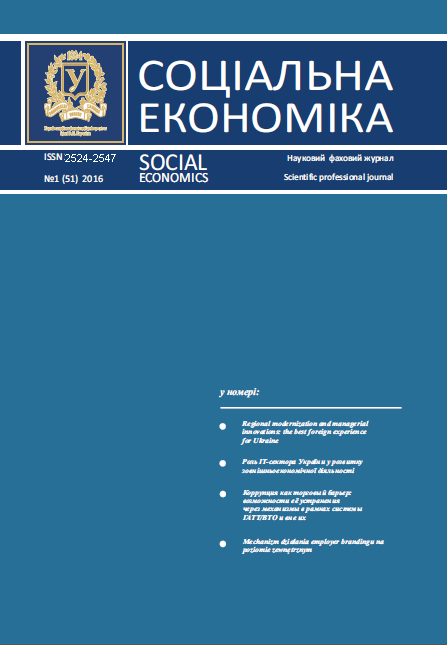КОРУПЦІЯ ЯК ТОРГОВИЙ БАР’ЄР: МОЖЛИВОСТІ ЇЇ УСУНЕННЯ ЧЕРЕЗ МЕХАНІЗМИ У РАМКАХ СИСТЕМІ ГАТТ/ВТО ТА ПОЗА НИХ
Анотація
Давання і одержання хабарів – це поширена практика не тільки в масштабах окремих національних господарств, а й в міжнародній торгівлі. У світовій економіці існує безліч можливостей для поширення корупційних практик, при цьому вони можуть використовуватися на декількох етапах однієї торгової транзакції. Так міжнародна торгівля може сприяти розвитку хабарництва, що спочатку здійснювалося тільки всередині національних адміністративних структур. Однак, чи може вона допомогти в боротьбі з цим явищем, яке негативно впливає на добробут як окремих людей, так і всієї держави? Загальновизнано, що хабарництво завдає шкоди національним і світовій економіці, але в рамках Світової організації торгівлі (СОТ), провідної інституції в сфері міжнародної торгівлі, як і раніше немає загальноприйнятої угоди, цілком присвяченої регулюванню цієї проблеми. Але в рамках СОТ і поза ними існують опції, за допомогою яких держави можуть боротися з корупцією як з торговим бар’єром. Метою цієї статті є вивчення переваг і недоліків цих опцій, а також оцінка необхідності використання державами певних механізмів для боротьби з корупцією і забезпечення вільної торгівлі товарами та послугами між членами СОТ. Умовно її можна розділити на дві частини: перша – визначення понять «хабарництво» і «міжнародна торгівля» та їх взаємозв’язку, друга – аналіз механізмів боротьби з корупцією в міжнародній торгівлі в рамках СОТ і поза ними.
Завантаження
Посилання
2. Wrage A. A. Bribery and extortion: undermining business, governments, and security. – Greenwood Publishing Group, 2007.
3. World Bank Group [Electronic resource]. – Accessed mode: http://worldbank.org.
4. World Trade Organization: official web-site [Electronic resource]. – Accessed mode: http://wto.org.
5. 2015 National trade estimate report of foreign trade barriers [Electronic resource] / Office of the United States Trade Representative. – 2015. – Accessed mode: https://ustr.gov/sites/default/files/2015% 20NTE%20Combined.pdf.
6. Maclean R. M. EU trade barrier regulation: tackling unfair foreign trade practices. – Sweet & Maxwell, 2006.
7. Bribery as a Non-tariff Barrier to Trade: A Case Study of East African Trade Corridors. – Transparence International Kenya. – 2012.
8. World Data Bank [Electronic resource]. – Accessed mode: http://databank.worldbank.org.
9. Loughman B. P., Sibery R. A. Bribery and Corruption: Navigating the global risks. – John Wiley & Sons, 2011. – Т. 568.
10. Cassin R. L. Bribery everywhere: chronicles from the foreign corrupt practices act. – Lulu. com, 2009.
11. Chow D. C. K., Schoenbaum T. J. International Trade Law: Problems, Cases, and Materials. – Wolters Kluwer Law & Business, 2013.
12. Шестопалова П. М. Деятельность международных институтов по борьбе с коррупцией в таможенных органах //Новый университет. Серия «Экономика и право». – 2015. – №. 5 (51).
13. Nadakavukaren Schefer K. Corruption and the WTO Legal System //Journal of World Trade. – 2009.– Т. 43. – №. 4. – С. 737-770.
14. Nichols P. M. Outlawing transnational bribery through the World Trade Organization //Law & Pol'y Int'l Bus. – 1996. – Т. 28. – С. 305.
15. VanGrasstek C. The History and Future of the World Trade Organization. – 2013.
16. Dutt P. Trade protection and bureaucratic corruption: an empirical investigation //Canadian Journal of Economics/Revue canadienne d'économique. – 2009. – Т. 42. – №. 1. – С. 155-183.
17. Thacker S. C. Democracy, Economic Policy, and Political Corruption in Comparative Perspective //Corruption and Democracy in Latin America, University of Pittsburgh Press: Pittsburgh. – 2009.





